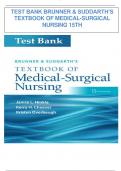Exam (elaborations)
Test Bank Brunner & Suddarth’s Textbook of Medical-Surgical Nursing 15th (chapter 1-7) with answers and feedback explanations
- Course
- Institution
Chapter 01: Health Care Delivery and Evidence-Based Nursing Practice 1. The public health nurse is presenting a health promotion class to a group of new mothers. How should the nurse best define health? A) Health is being disease free. B) Health is having fulfillment in all domains of li...
[Show more]



